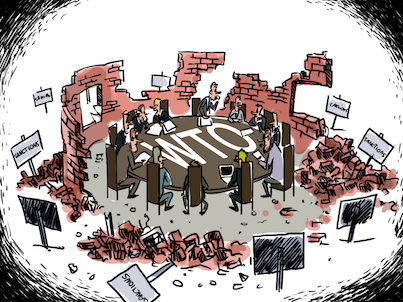The World Trade Organization is set to rule for the first time on a dispute involving a member’s national security, crossing a red line set out by President Donald Trump and putting the arbiter of international trade conflicts on a collision course with the U.S.
The WTO will issue a ruling on a case in which Russia imposed trade restrictions on Ukraine, saying they were necessary in the interest of national security, according to an official with knowledge of the report who asked not to be named because the process is private. The decision could still be appealed or settled outside of the WTO. The ruling confirms the WTO’s authority to determine whether such measures are necessary to protect a country’s security.

“The fact that the panel is actually going to engage in an inquiry of whether there is basis for these national security measures means things are looking really bleak for the U.S.” Nicolas Lamp, a former dispute settlement attorney at the WTO, said in an interview on Wednesday. “For the U.S., this finding could confirm all their worst fears about the WTO.”
A WTO spokesman declined to comment on the decision.
‘Total Violation’
U.S. trade officials say the WTO has no authority to mediate national security matters and should simply issue a decision that says the matter is outside of the WTO’s remit. WTO Director-General Roberto Azevedo has gone so far as to warn countries against taking this dispute to the WTO, arguing that it instead “requires conversation at the highest political level.”
Many have questioned how genuine the U.S. tariff justifications were, with some of America’s closest allies those most affected by the duties, such as the EU, Canada and Mexico. “If players in the world don’t stick to the rule book the system may collapse,” Cecilia Malmstrom, the EU’s trade commissioner, said in a press conference in Brussels a day after the U.S. imposed the tariffs.
“The fact that these tariffs are a total violation of our WTO obligations I think is pretty much unequivocal,” Jennifer Hillman, a former WTO appellate body member, said in an interview. “That means you are going to have to say that you are in some kind of war with Canada, Mexico and the EU. I don’t think they are doing to say that.”
Existential Threat
The dispute could pose an existential threat for the WTO, which has long avoided a politically fraught confrontation over national security disputes for fear that doing so would open a Pandora’s box of protectionist measures and tit-for-tat retaliation. In backing Russia’s right to implement some restrictions on Ukraine, the WTO could open the door to any country to implement protectionist trade measures using that justification.
Various countries have already invoked the WTO’s national security exemption in regional fights like Saudi Arabia’s economic dispute with Qatar and India’s conflict with Pakistan.
“So far, a lot of these cases do involve real conflicts—Ukraine and Russia; Qatar and these other countries; India and Pakistan,” Simon Lester, the associate director of Cato Institute’s Herbert A. Stiefel Center for Trade Policy Studies in Washington, said in an interview. “The U.S. metal tariffs “seem a little more far-fetched.”









